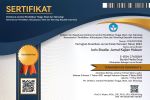Analisis Yuridis Pertimbangan Hakim Mahkamah Agung Terhadap Pencabutan Pengaduan Yang Melewati Batas Waktu Dengan Menerapkan Pendekatan Restorative Justice (Analisis Yurisprudensi Mahkamah Agung No. 1600 K/Pid/2009 dan Putusan No. 2238 K/Pid.Sus/2013)
Abstract
Keywords
Full Text:
PDFReferences
Abdurrahman, Muslan, 2009, Sosiologi dan Metode Penelitian Hukum, UMM Pres, Malang
Ansori, 2015, Restorative Justice menuju sistem peradilan pidana terpadu, Varia peradilan No. 350, Ikatan Hakim Indonesia
Apeldoorn, Van, 2006, Ikhtisar Ilmu Hukum, Badan Penerbit Iblam Jakarta
Farit, Kurniawan, 2011, Pertanggungjawaban Pidana Orang Yang Menggadaikan Mobil Dalam Status Sewa, UPN Surabaya
Handoko, Duwi, 2017, Asas-asas Hukum Pidana dan Hukum Penintensier di Indonesia, Hawa dan Ahwa, Pekan Baru
Hutauruk, Rufinus, 2014, Penanggulangan Kejahatan Korporasi Melalui Pendekatan Restoratif Suatu Terobosan Hukum, PT Sinar Grafika, Jakarta
IPDA L. NABABAN, Penyidik Polsek Namo Rambe
Jonkes, J.E., 1987, Buku Pedoman Hukum Pidana Hindia Belanda, PT. Bina aksara, Jakarta
Kitab Undang-Undang Hukum Pidana
Ni Kadek Ayu Ismadewi dan Hartiwiningsih, “Mediasi penal dalam penyelesaian perkara KDRT”, Jurnal Pascasarjana Hukum UNS Volume V, Surakarta
Putusan Mahkamah Agung No. 2238 K/Pid.sus/2013
Putusan Pengadilan Negeri Sragen No. 54/Pid.sus/2014/PN. Sgn
Putusan Yurisprudensi Mahkamah Agung No. 1600 K/Pid/2009
Rahardjo, Satjipto, 2007, masalah penegakan hukum suatu tinjauan sosiologis, CV Sinar Baru, Bandung
Ramadhani, Rahmat dan Rachmad Abduh. (2021). “Legal Assurance of the Land Registration Process in the Pandemic Time of Covid-19” Budapest International Research and Critics Institute-Journa 4, No. 1.
Ramadhani, Rahmat dan Ummi Salamah Lubis. (2021). “Opportunities and Challenges for the Badan Pertanahan Nasional (BPN) in Handling Land Cases in the New Normal Era” Legality: Jurnal Ilmiah Hukum 29, No. 1.
Soesilo, R, 1995, Kitab Undang-Undang Hukum Pidana (KUHP) serta Komentar-Komentarnya Lengkap Pasal Demi Pasal, Bogor
Surat Edaran Jaksa Agung No. SE-004/J.A/11/1993 tentang pembuatan surat dakwaan
Tridianto, Agus, Yoachim, Keadilan Restoratif, 2015, Cahaya Atma Pustaka, Yogyakarta
Utrecht, E, 2018, Hukum Pidana II Rangkaian Sari Kuliah, Pustaka Tinta Mas, Surabaya
UU No. 23 Tahun 2004 Tentang Penghapusan Kekerasan Dalam Rumah Tangga
UU No. 8 Tahun 1981 Tentang Kitab Undang-Undang Hukum Acara Pidana
UU. No. 48 Tahun 2009 tentang Kekuasaan Kehakiman
Wahid, Eriyanto, 2009, Keadilan Restoratif dan Peradilan Konvensional dalam hukum pidana, Universitas Trisakti, Jakarta
Zaidan, Ali , 2015, Menuju Pembaruan Hukum Pidana, PT Sinar Grafika, Jakarta
DOI: https://doi.org/10.55357/is.v2i2.101
Refbacks
- There are currently no refbacks.

This work is licensed under a Creative Commons Attribution 4.0 International License.
Iuris Studia: Jurnal Kajian Hukum published by BUNDA MEDIA GRUP is abstracting & indexing in the following databases:
licensed under a Creative Commons Attribution-ShareAlike 4.0 International License










